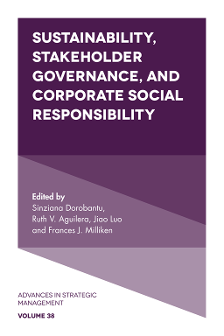
Index
Sustainability, Stakeholder Governance, and Corporate Social Responsibility
ISBN: 978-1-78756-316-2, eISBN: 978-1-78756-315-5
ISSN: 0742-3322
Publication date: 10 August 2018
Citation
(2018), "Index", Sustainability, Stakeholder Governance, and Corporate Social Responsibility (Advances in Strategic Management, Vol. 38), Emerald Publishing Limited, Leeds, pp. 389-396. https://doi.org/10.1108/S0742-332220180000038002
Publisher
:Emerald Publishing Limited
Copyright © 2018 Emerald Publishing Limited
INDEX
- Prelims
- Introduction: Contemplating the Connections between Sustainability, Stakeholder Governance, and Corporate Social Responsibility
- Part I Ownership and Its Implications for Sustainability, Stakeholder Governance, and CSR
- Stakeholders and Corporate Social Responsibility: An Ownership Perspective
- Public versus Private Firms: Energy Efficiency, Toxic Emissions, and Abatement Spending
- The Interdependence of Public and Private Stakeholder Influence: A Study of Political Patronage and Corporate Philanthropy in China
- State-Owned Multinationals and Drivers of Sustainability Practices: An Exploratory Study of National Oil Companies
- Part II Stakeholder Alignment and Coalitions
- Governing the Void between Stakeholder Management and Sustainability
- Venture Capital’s Role in Creating a More Sustainable Society: The Role of Exits in Clean Energy’s Investment Growth
- CSR Strategic Implementation in MNEs: The Role of Subsidiaries’ Stakeholders
- Large Corporations, Social Capital, and Community Philanthropy
- Re-thinking the CSP–CFP Linkage: Analyzing the Mechanisms Involved in Translating Socially Responsible Behavior to Financial Performance
- Part III Dynamic Evolution of Concepts and Industry Practices
- Naturalizing Sustainability: How Industry Actors Make Sense of a Threatening Concept
- Doing Well by Doing Good: A Comparative Analysis of ESG Standards for Responsible Investment
- The Effect of Market and Nonmarket Competition on Firm and Industry Corporate Social Responsibility
- Gone with the Wind: The Evolving Influence of Social Movements and Counter Movements on Entrepreneurial Activity in the US Wind Industry
- The Association between Ethics and Stakeholder Theory
- Index